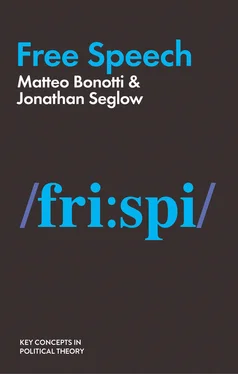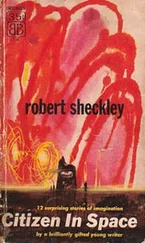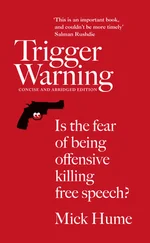An opinion that corn-dealers are starvers of the poor, or that private property is robbery, ought to be unmolested when simply circulated through the press, but may justly incur punishment when delivered orally to an excited mob assembled before the house of a corn-dealer, or when handed about among the same mob in the form of a placard. (Mill 2006, p. 64)
This example looks like what we would nowadays call ‘incitement to hatred’, whereby a speaker stirs up hatred or hostility in the audience against a bystander, possibly causing violence. While Mill’s bystanders are relatively privileged corn dealers and property owners, contemporary laws against incitement to hatred are generally intended to protect vulnerable religious, ethnic or other minorities.
Other restrictions consistent with Mill’s doctrine concern forms of free speech that invade a person’s self-regarding liberty to determine her own life (within the bounds of the harm principle). According to a Mill scholar such as Jonathan Riley (2005), examples in this category include the malicious invasion of another person’s privacy, libellous speech that damages a person’s social reputation, and false advertising in which manufacturers exploit consumers’ relative ignorance about their products. Exactly what justifies these restrictions raises difficult issues in Mill scholarship, but the general answer is that these types of speech not only harm others; they also contribute little or nothing to the process of discovering truths that people have an interest in knowing (cf. Brink 2008).
Thus, in a landmark US Supreme Court case in the early 1940s, a Jehovah’s witness was accused of using ‘fighting words’ – that is, words that provoke an immediate and often violent reaction in the listener – against a police officer. The Court ruled that ‘such utterances are no essential part of any exposition of ideas, and are of such slight social value as a step to truth that any benefit that may be derived from them is clearly outweighed by the social interest in order and morality’ ( Chaplinsky v New Hampshire 1942). It is worth noting that in all such cases the harm is relatively short term and directed at specific individuals, and thus easy to assess within Mill’s consequentialist framework. Where harms are longer term and more diffuse, they raise, among other issues, questions about the responsibility of the speaker (Ten 1980), as we shall see in later chapters, when we discuss hate speech and pornography.
Mill’s case for free speech has been attacked on various grounds. One common criticism is that he proposes an over-intellectualised model of free speech, in which the social world is narrowly represented as a seminar room populated by earnest searchers for truth (Haworth 1998, pp. 24–32; Barendt 2005, pp. 9–10). But how about, for example, football chants, racist jokes, picketing strikers, or graffiti that stake out a gang’s territory (see McKinnon 2006, pp. 123–4)? This list might suggest that fewer things engage our deliberative capacities than Mill thinks. But perhaps more is covered by the truth discovery argument than appears at first glance. Perhaps football chants bring home to third parties how football is a ‘way of life’ for diehard supporters. Likewise, racist jokes are offensive and sometimes hateful, but they also tell us something about people’s attitudes towards race and ethnicity – and these views may be called out and contested. The ‘Fuck the Draft’ slogan in protest against the Vietnam war, a slogan that the Supreme Court defended as protected speech in Cohen v California (1971), may have helped to stimulate debate about the ethics of that war among those who saw it (see Barendt 2005, p. 10).
A further issue is that Mill seems to rely on an overly optimistic view of the likely consequences of free speech. Permissive public debate may result not in human progress, as measured by the discovery of truth and the development of our deliberative capacities, but in the rise and spread of extremist and other harmful views, with potentially catastrophic consequences for liberal democracy. Nazi Germany, for example, emerged from the thoroughly liberal Weimar Republic, and there are many recent examples of populism and far-right extremism in Europe, the United States, India and elsewhere, all spreading through a culture of free speech. Populist movements are often marked by the phenomenon of groupthink and a culture of intolerance; they do not consist of citizens who dispassionately think through the issues for themselves (and the same may be true to some extent of liberal regimes, too). Of course, whether speech should be limited in order to protect people’s rights and other interests is a large and much contested question, as we will see in detail in later chapters. But Mill’s view is particularly susceptible to the problem of the spread of harmful speech, and this is for two reasons.
First, unlike the autonomy and democracy arguments (which we will consider in a moment), Mill’s future-oriented consequentialist approach tells us that the value of free speech lies in its results, and more specifically in its positive effect on enlightened human progress. If this does not happen, if a positive effect is not registered, his theory falters. Second, as a utilitarian interested in human happiness, Mill seemingly should be concerned with other sources of human utility besides the achievement of better justified views and opinions. The fear, insecurity, discrimination and sometimes violence that vulnerable ethnic, religious or sexual minorities suffer as a result of hate speech significantly undermine the well-being of these groups; surely they, too, should count when it comes to assessing the consequences of freedom of speech? Conversely, racist, Islamophobic, anti-Semitic, homophobic and other forms of harmful speech probably serve group solidarity and the identity formation of their illiberal authors, but should not these, too, count as sources of well-being, in the eyes of the consistent utilitarian? If so, Mill’s consequentialist approach to free speech may seem less liberal than it appears at first glance.
Yet very often Mill is correct: the best way to combat false or harmful speech is, frequently, with more speech. Few of us think that people who deny the reality of human-caused climate change, or maintain that essential vaccines spread harmful illnesses, or argue that the COVID-19 pandemic was caused by 5G mobile phone masts 1should be actively censored by the state or by social media, although there may be a case for not giving them a prominent platform (e.g. on television). To that extent, most of us are good Millians: we think that false speech should be addressed with reason and evidence rather than silenced.
Autonomy involves a person’s governing her life according to her own judgement of what is best. It is opposed to a state in which some other agents usurp or thwart that judgement and direct the person’s life themselves. Such agents might be individuals (e.g. a slave owner, or a controlling husband who runs his wife’s life), groups (e.g. a religious hierarchy that directs every aspect of its adherents’ lives) or the state, which has the capacity coercively to require that citizens live in a certain way. Although there are affinities between autonomy and Mill’s ideal of individuality, the relationship between autonomy and free speech is more complex than in Mill’s truth-based account, for at least two reasons. First, it has been proposed in different ways by different contemporary writers; second, we need to attend more carefully to the distinctions between deontological and consequentialist models and between speaker- and audience-based views. A further distinction is between formal and substantive theories of autonomy (Baker 2011, pp. 253–4). Substantive autonomy is a character ideal – namely the ideal of self-government, which a person may realise in her life. Formal autonomy implies that third parties respect a person’s right to conduct her life according to her own best judgement.
Читать дальше












